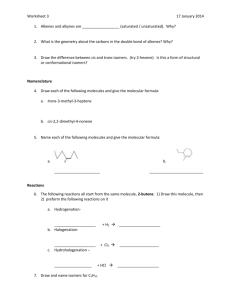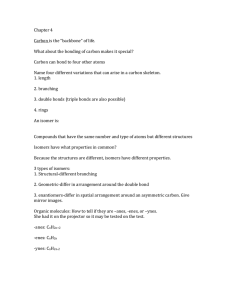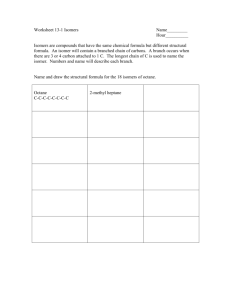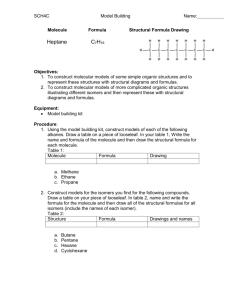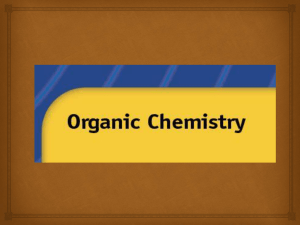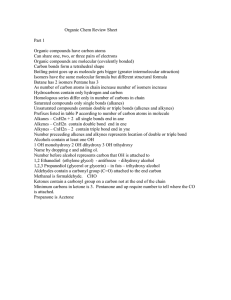1 H 2 O
advertisement
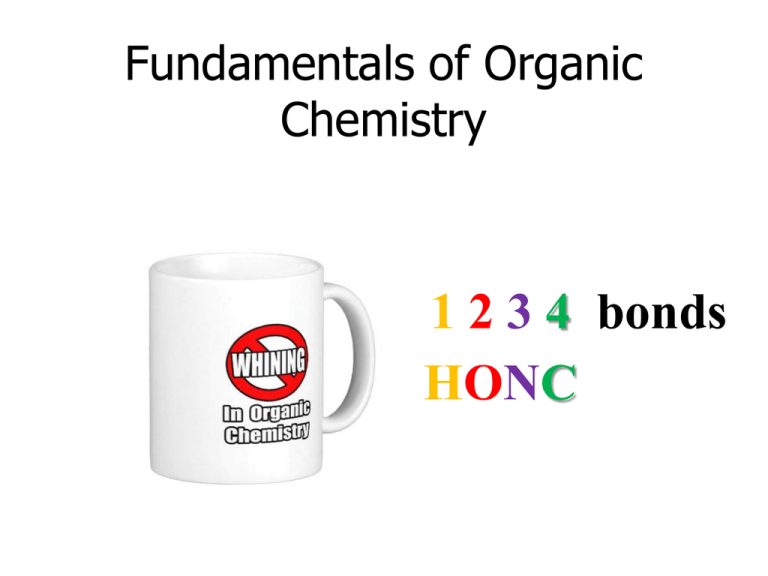
Fundamentals of Organic Chemistry 1 2 3 4 bonds HONC What is organic chemistry? • study of carbon, the compounds it makes, and the reactions it undergoes • over 16 million carbon-containing compounds are known • because the C-C single bond (348 kJ/mol) and the C-H bond (412 kJ/mol) are strong, carbon compounds are stable • carbon can form chains and rings Empirical, molecular & structural formulas 2 • empirical formula – simplest ratio of atoms in a molecule • molecular formula – actual numbers of atoms in a molecule Empirical Formula Molecular Formula CH4 CH4 CH3 C2H6 CH2O C6H12O6 CH2 C4H8 CH2 C8H16 structural formula • unambiguously shows how the atoms are bonded together • can use condensed structural formulas – bonds are omitted, repeated groups put together, side chains put in brackets • CH3CH2CH2CH2CH2CH3 –or even CH3(CH2)4CH3 • CH3CH(CH3) CH2CH3 condensed skeletal formula – every “corner” or “end” represents a carbon unless a different element is there – hydrogens are implied Isomers • (structural) isomers: compounds with the same molecular formula but different structure (arrangement of atoms) • different isomers can have different chemical properties • and different physical properties such as melting point and boiling point Structural Formulas for C4H10O Isomers Alkanes Structural formulas for the isomers of noncyclic alkanes up to C6 • hydrocarbon chains where all the bonds between carbons are SINGLE bonds • draw out and write the structural formulas for all isomers that can be formed by: – – – – – – CH4 C2H6 C3H8 C4H10 C5H12 C6H14 Richard Thornley 2:54 Naming the isomers (IUPAC) of non-cyclic alkanes up to C6 1. determine the longest carbon chain – – 1 2 3 4 5 6 use the prefix to denote the number carbons ending is -ane MethEthPropButPentHex- Monkeys Eat Peeled Bananas Alkenes Structural formulas for the isomers of the straight chain alkenes up to C6 • alkenes have a double bond between two or more of the carbons • suffix changes to -ene • when there are 4 or more carbon atoms in a chain, the location of the double bond is indicated by a number • begin counting the carbons closest to the end with the C=C bond • draw the structural formulas for all isomers that can be formed by each – C2H4 – C3H6 Richard Thornley 10.1.7 (1:37) – C4H8 These are only straight chain isomers. – C5H10 – C6H12 pent – 1 – ene pent – 2 – ene Functional Groups • a part of the molecule that stands out as an unusual or unique part of the molecule • add these somewhere on alkanes and alkenes • the molecule often has certain characteristics based on a functional group • the entire class of compounds is often named according to the functional group they contain • “R” in a structural formula of a molecule just stands for any other atoms other than the functional group website on functional groups click here carboxyl - found in carboxylic acids - putrid smelling ester - found in esters - sweet smelling carbonyl - found in ketones - sweet, minty, camphor smelling hydroxyl - found in alcohols - sweet, camphor smelling amino - found in amines - fishy smelling - look for N, doesn’t matter how many H’s Smells • humans can tell the difference between 10,000 different odors • a more distant sense allowing us to detect small concentrations of airborne substances – must be a gas • therefore cannot smell ionic compounds since they are normally solids at room temperature • molecules fit into certain receptors sites in the human body as a result of their shape – signals are then sent to the brain • compounds that have similar smells have similar structural formulas • polar molecules may “stick” to receptor sites better than non-polar Amino Acids/Proteins • the molecular subunits/building blocks of proteins (the essential building blocks for living organisms) • 20 different amino acids are used to synthesize almost all the proteins in almost all living cells • protein formation – link is between carboxyl group on one a.a. and the amino group on the other. – water is formed and remaining N and C link together called a peptide bond Protein movie
